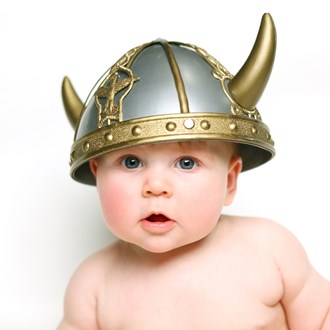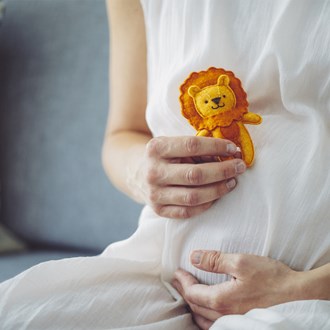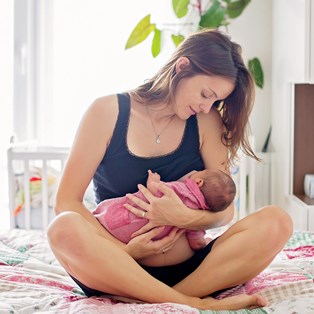Chances of getting pregnant at 35-50 years old

Your guide to conception and birth later in life
Your age is the most important factor affecting your fertility and your chance of having a baby. While it is possible to give birth of healthy babies in your late thirties or early to mid-forties, many women in this age bracket will struggle to fall pregnant.
And while many celebrities are having babies in their late forties and even early fifties, including Geena Davis, Gwen Stefani and Halle Berry, it’s important to remember that many of them are likely to have conceived with donor eggs from a younger woman.
That said, try not to worry about being too old to have a baby as it is only one of several factors, so there is plenty you can do to maximise your chances of conceiving and carrying a baby to full term.

Getty Images
How does age impact your chances of getting pregnant?
Starting at about age 32, a woman’s chance of conceiving starts to decline, according to the Better Health Channel. From age 35, the fertility decline speeds up and by age 40, fertility has fallen by half.
Your partner’s age needs to be taken into account too. Men aged 45 and older are less fertile and some health conditions are more common in children with older fathers.
As we age, our potential to have children decreases, although the exact time when this starts to happen can vary from one person to the next.
Women younger than 35 and men younger than 40 do have a better chance of having a child than people who are older, according to Your Fertility. This is true for natural pregnancies and for pregnancies conceived through assisted reproductive treatments such as IVF (in-vitro fertilisation).
Women under 30 have around a 20 per cent chance of falling pregnant naturally each month. By age 40, the chance of pregnancy reduces to about five per cent each month.
If you are considering IVF, the statistics vary depending on the clinic, however Genea’s success rates show that per fresh embryo transfer a 35-39 year woman has a 27.4 per cent chance of a live birth and for the same age group a 38.4 per cent chance of a baby following a frozen embryo transfer.
This guide to female fertility age chart will help you work out your chances of getting pregnant:

How many eggs do you have at different ages?
Younger women have more and healthier eggs than older women. A woman is born with all the eggs she will ever have. She starts with around a million eggs at birth, and by the time she reaches puberty she has around 300,000 to 500,000 left.
From this huge number of eggs, only 300 will ever become mature and be released in the process known as ovulation. As a woman ages, her eggs age too and their number and quality reduce over time. This means her chance of having a baby also reduces over time, particularly for women over 35 years of age.

Getty images
What are your chances of having twins as you get older?
There are a few factors that increase your chances of having twins. Fertility drugs and having a family history of twin births are two factors.
However, as women age, they are more likely to have twins too. Researchers at Vrije University Medical Centre in the Netherlands found that older women have higher levels of the hormone FSH, increasing their chances of having twins.
The study examined a group of more than 500 women aged 24-41 who were undergoing intrauterine insemination due to unexplained infertility or mild male infertility. The researchers measured the women’s hormones and checked ultrasound images of the women’s reproductive system.
The researchers concluded that older women had higher levels of a hormone called FSH (follicle-stimulating hormone), and also discovered that older women were more likely to prepare more than one egg per menstrual cycle. These patterns were strongest in women aged 35 and older.

Getty Images
How long does it take to to fall pregnant when you’re over 35?
This is a bit like asking ‘how long is a piece of string?’, as there are so many factors to consider, including the age, health, weight, diet and lifestyle of both partners – as well as any fertility issues.
After one year of trying, around 63 per cent of women in their early thirties will fall pregnant. This drops to around 36 per cent for women in their early forties.
What can I do to increase my chances of falling pregnant?
Making healthy choices now increases your chances of having a baby in the future – and that goes for your partner, too. Eating a healthy, balanced diet, exercising regularly, quitting smoking and reducing or eliminating alcohol consumption are all simple steps you can take towards a healthier lifestyle.
Any woman trying to conceive should also take folate or a folic acid supplement. Some studies show that Coenzyme Q10 or CoQ10 has been found to improve egg quality in aging mice but there’s no research showing this in humans yet. If you are considering taking additional supplements speak with your GP or caregiver first.

Getty Images
When should I see a doctor if I can’t fall pregnant naturally?
If you have tried for 12 months or more (six months if you’re a woman older than 35), it’s time to talk to your doctor about your options. The best place to start is to see your GP.
If you are having difficulty falling pregnant it may or may not have to do with your age. However, because as you get older, your odds for pregnancy success even with fertility treatment will decrease, it's important to get help quickly. If you are age 40 or older and wanting to get pregnant, see your doctor right away for some basic fertility tests.
If your GP refers you to a fertility clinic and you go down the road of assisted conception, remember that IVF is not a guarantee. However, it may increase your chances, and if you look into egg donor IVF, the chances increase even more.

Getty images
Does it make any difference if it’s your first baby or second baby?
If you’ve already had a child, you can still have issues falling pregnant a second time – called ‘secondary infertility.’
There can be a variety of reasons for secondary infertility, including being a woman over the age of 35, having a partner with a low sperm count, having fertility issues such as polycystic ovary syndrome, being overweight, drinking excessive amounts of alcohol (more than two drinks per day or seven drinks per week) and smoking.
While it isn’t uncommon, the good news is that you’re more likely to have a successful second pregnancy if you already have a child, according to Dr Cynthia Austin, an obstetrician and gynaecologist.














